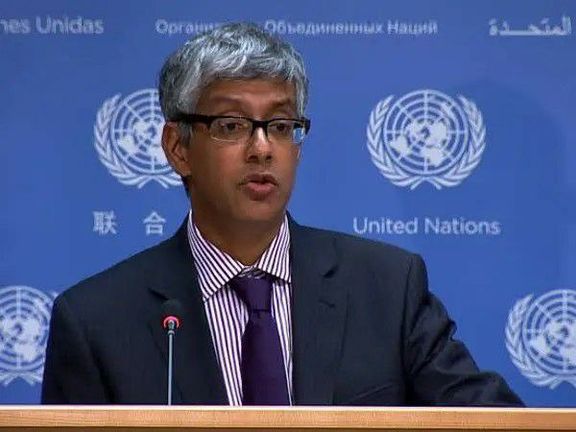UN Doesn’t Treat Taliban As Recognised Government, Says UNSG Spokesperson

Farhan Haq, UN Secretary-General Deputy Spokesperson, called gender apartheid in Afghanistan a key concern and urged respect for Afghan women's rights.

Farhan Haq, UN Secretary-General Deputy Spokesperson, called gender apartheid in Afghanistan a key concern and urged respect for Afghan women's rights.
Haq told Afghanistan International that the UN does not treat the Taliban as the legal and official government of Afghanistan in the Doha meeting.
Maryam Rahmati, a reporter of Afghanistan International, asked Farhan on Tuesday for his views on the recommendations of Richard Bennett, the UN Special Rapporteur on Afghanistan, suggesting that gender apartheid should be recognised as a crime against humanity.
In response, Haq said, "We want to ensure that women's rights in Afghan society are respected just as they are necessary everywhere in the world."
He called gender apartheid in Afghanistan a key concern.
The Deputy Spokesperson for the UN Secretary-General, in response to Bennett's recommendation that the Taliban should not be treated as the legal and official government, said, "We treat them [the Taliban] as the de facto authorities, they are not treated as the recognised government of Afghanistan."
Bennett warned at the 56th session of the UN Human Rights Council that violence against Afghan women under Taliban control has become strong and widespread.
He described the exclusion of women from public life and the deprivation of Afghan women and girls from work and education as crimes against humanity and gender apartheid.
Bennett called on the international community to stop legitimising and normalising relations with the Taliban and not to treat the Taliban as a legitimate government.
Informed sources reported that the UN has accepted some of the Taliban's demands as a precondition for attending the third Doha meeting.
Heather Barr of Human Rights Watch said that the UN has given many concessions for the Taliban's participation in the Doha meeting and accused the organisation of ignoring the recommendations of Richard Bennett.